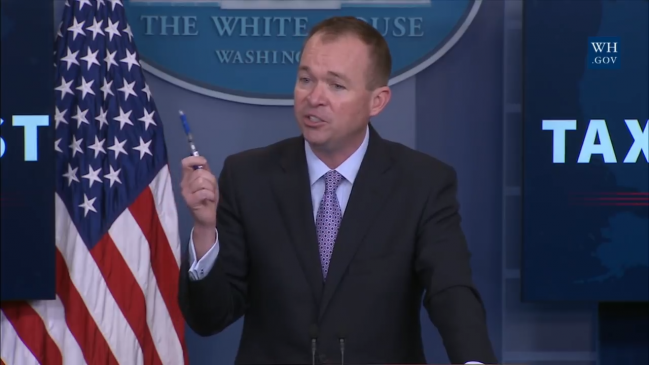New White House Bitcoin Supporter Unlikely to Cause a Crypto Stir
December 16, 2018 by William Peaster
This week President Donald Trump tapped Mick Mulvaney, his administration’s budget director, to serve as acting White House chief of staff. Notably, Mulvaney has made past comments that suggested strong support for bitcoin. But anyone expecting Mulvaney to be an impactful White House bitcoin crusader should have their doubts, practically speaking.
Also see: Meet Hydro: Large Relayer Forking 0x, Axing ZRX
Subscribe to the Bitsonline YouTube channel for great videos featuring industry insiders & experts
Mulvaney Will Temporarily Be Chief of Staff, Unlikely to Have a Tenure that Impacts Bitcoin Much
President Trump has named Mick Mulvaney, his current Director of the Office of Management and Budget (OMB), as his acting chief of staff.
The move comes as General John Kelly, who had previously served as the president’s top aide, departed the White House this month.
Tired of the chief of staff search headlines, Trump went to Mulvaney and said he had a job to fill. Mulvaney said he would do it on a temp basis, I’m told. But source says Mulvaney is eager to do the job and not worried about the challenge of dealing wirh Trump.
— Jim Acosta (@Acosta) December 15, 2018
Mulvaney’s appointment immediately generated buzz in the cryptocurrency ecosystem, where headline watchers noted the 1600 Pennsylvania Avenue-inbound budget director had previously lavished praise on bitcoin.
Speaking to a chapter of the controversial John Birch Society in 2016, Mulvaney argued bitcoin was a step forward because it was “not manipulatable [sic] by any government,” adding that the Federal Reserve has “devalued the dollar” — a sentiment that’s right at home with Fed critics in the cryptocurrency ecosystem.
Trump’s OMB pick is anti-Fed and pro-Bitcoin https://t.co/jlwxVGyMzE pic.twitter.com/rbuYmmIcSt
— Matt O’Brien (@ObsoleteDogma) December 19, 2016
The resurfacing of these comments upon Mulvaney’s selection to be the president’s acting chief of staff caused many bitcoiners to wonder how the new White House aide might affect bitcoin from “the inside.”
Realistically, however, Mulvaney’s tenure as President Trump’s top aide is unlikely to directly impact bitcoin — at least as things stand.
For one, Mulvaney will be acting chief of staff. He could stick around for a year, but no one would be surprised if he got a full-time replacement in a month’s time or less. He simply may not be around the residence for long.

Secondly, and more importantly, Mulvaney will reportedly be staying on as OMB director while he assumes the chief of staff’s duties.
If Mulvaney wasn’t busy as hell before, he will be now. He likely won’t have much time to sleep in the weeks ahead, so he likely won’t have much time to advocate for personal interests like bitcoin either. And his authority will be limited to carrying out the orders of the president.
Yes, Mulvaney’s expressed some optimism about Bitcoin in the past. I wouldn’t really read too much into what this might mean for the future for cryptocurrencies in Washington though. https://t.co/AMO0PU1G9I
— Colin Wilhelm (@colinwilhelm) December 15, 2018
Where Mulvaney’s new role is, in fact, more notable for the cryptoverse is that 1) it can be seen, and has already been cast, as a public relations coup for bitcoin, and 2) pro-bitcoin Mulvaney will have Trump’s ear as much as anyone for as long as he serves as the president’s top aide.
What both of these threads will ultimately amount to remains to be seen.
They are certainly ones to keep an eye on, particularly the latter, but if it’s direct political action on bitcoin you’re craving, you’re better off looking to the states for now — not the White House.
In U.S., Bitcoin Increasingly Becoming a Political Factor
In 2018, America saw its first two pro-bitcoin governors elected: Jared Polis in Colorado and Gavin Newsom in California.
For his part, Governor-elect Polis co-chairs the Congressional Blockchain Caucus, an association in the House of Representatives he helped start in February 2017. He has talked openly of his desire to legislatively embrace bitcoin and blockchain tech since at least 2014.
As for Governor-elect Newsom, he was among the first U.S. politicos ever to accept political donations in bitcoin.
Once sworn in next year, these two governors will have wide executive purviews in how they can approach the cryptoeconomy in their states.
Some states, like Wyoming, are seeing their legislatures forge their own paths on crypto and blockchain without waiting around for what a governor says.
Whatever does end up happening in the U.S. in the years ahead, it’s clear that bitcoin has only just begun to become a political topic in America.
What’s your take? Will the new White House bitcoiner be impactful or a non-story when it comes to advocating for the genesis cryptocurrency? Let us know in the comments section below.
Images via The White House, Pixabay




